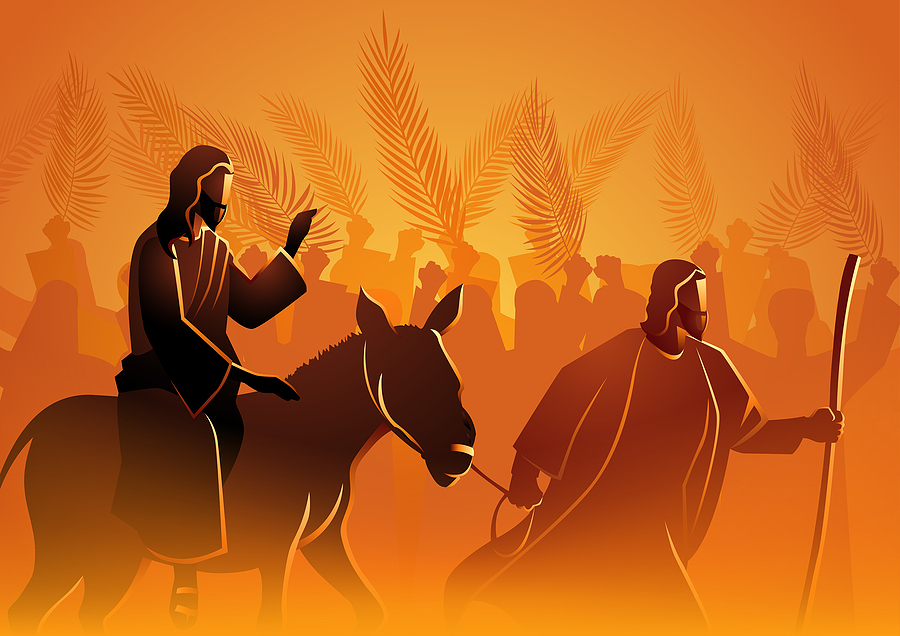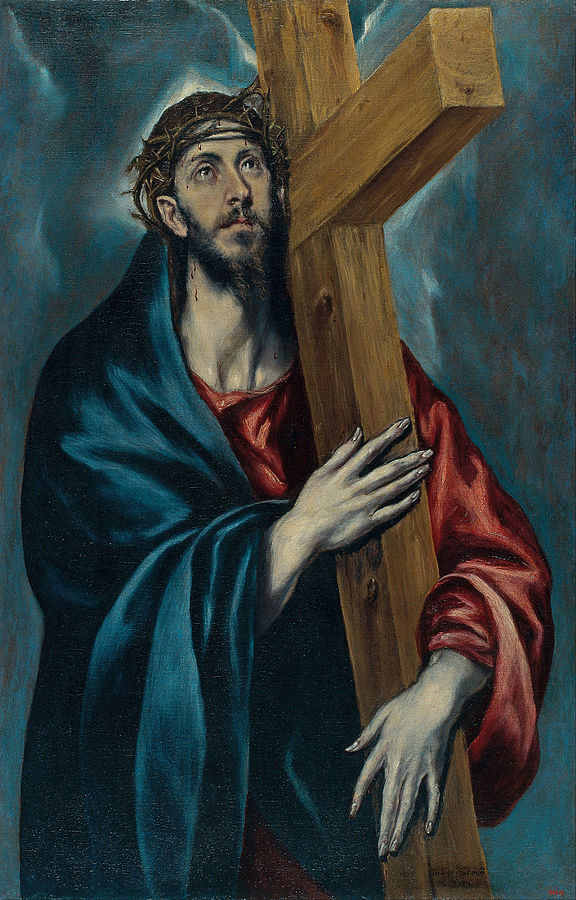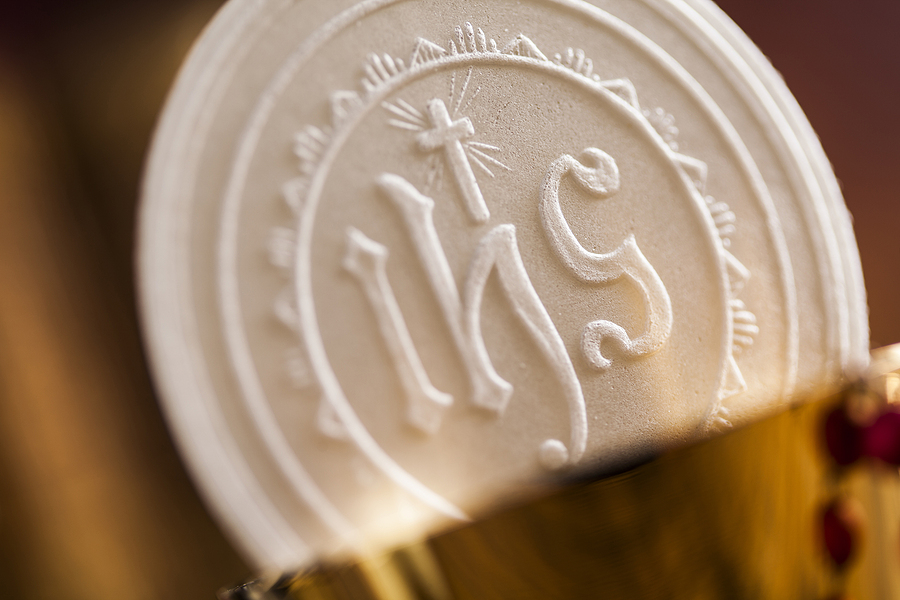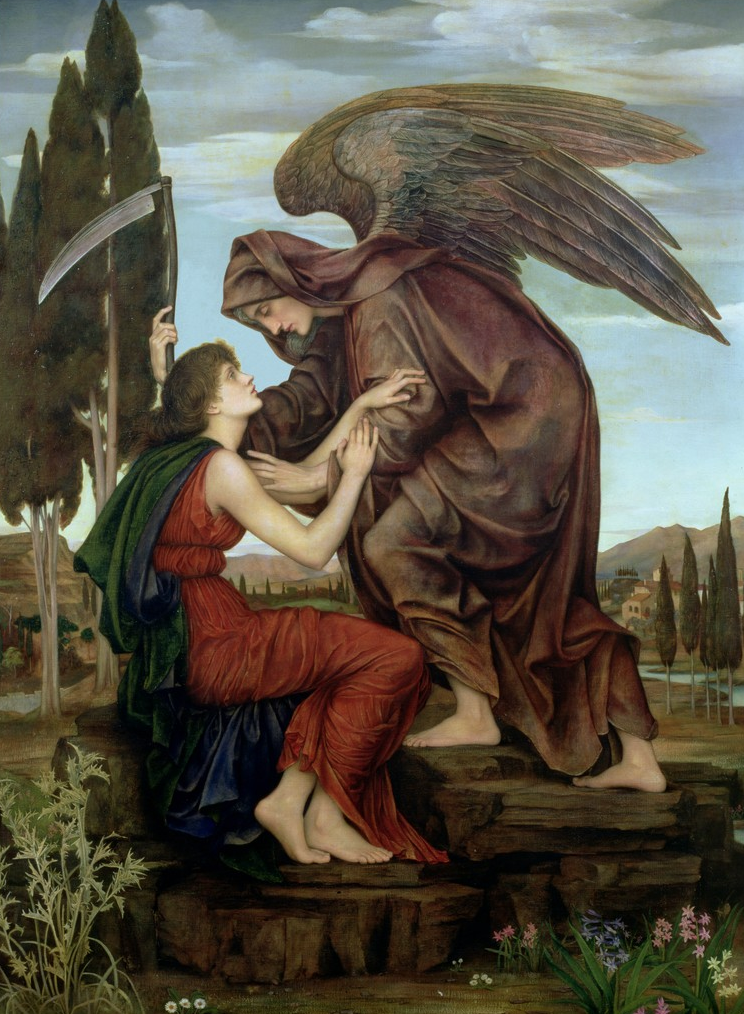
He rides into Jerusalem: Palm Sunday
He rides into Jerusalem amidst lavish, unrestrained, almost unanimous exaltation.
Slowly-on the colt of a donkey.
So many details here, in this story.
Why a colt?
So that a fully grown adult male on the colt prefigures the excruciating burden He will soon carry?
To assure that these faces, now adoring, soon to turn vicious as they scream, “Crucify Him!”, to the ones who know His innocence, perhaps even sense that “Something greater than Solomon is here” but who lack the courage to defy the mob and confess the Truth that stands before them can see clearly this face…these eyes?
The story is familiar in the telling, isn’t it?
Maybe too familiar. It’s a very long mass and the only one where we parishioners participate in proclaiming the Gospel.
Our part?
To mock, along with Peter, to deny and most terribly, shout,
“Crucify him!””
Why do we do this each year?
Maybe to look at our sin through the eyes of God?
To understand that our snide comment about our ‘friend’s’ new haircut, or self-righteous condemnation of our representative in Washington, is, to God, as serious a sin as any?
“We see ourselves as decent people, as Catholics in good standing. Indeed we are good people. The Church, though, would like us to see reality with the eyes of God, at least on this day, Palm Sunday.
In the eyes of God sin is sin, is sin.
From the biggest to the slightest, any sin is an affront to His majesty and a self-inflicted wound undermining the soul slowly, even imperceptibly, or quite aggressively with a frontal, mortal attack.
Any sin, big and small alike, has also uncontrollable, horrific consequences affecting even the most innocent of children.
Therefore, the traces of shock still lingering after today’s reading of the Passion narrative should suffice to help us resolve, with distinct decisiveness, to do two things. To look at any sin with God’s eyes, counting on His grace to resist even the fiercest temptations…read more
Throughout his astonishing book, The Lord, Romano Guardini explains patiently and persistently that the belief that Christ was born to die on the cross is far from the truth. That phrase, scandal of the cross was well-known up through the middle ages. But lost in recent centuries. It had never crossed my mind that the life of Christ was headed anywhere but toward an agonizing end. Until now.
And once we consider that shift from thinking there was not just one fall of man, but two, Palm Sunday becomes far more than palms and donkeys.
Guardini writes of the very air as being saturated with divinity. The phrase explains Christ’s reply to the Pharisees attempting to quiet the jubilant throng of inspired people.
“I tell you,” He answered, “if they remain silent, the very stones will cry out.”
Imagine it.
Being so inundated with grace that all fear is erased. Everything obliterated but grace, the all pervasive knowledge that Truth is right in front of you, walking among you. So much so that defying the authorities is as nothing.
Consider how that could have felt, the absence of any fear…then take a leap to how everything could have changed. Everything.
My fictional Pontius Pilate reflects about the first Palm Sunday:
…Was this the riot that Caiaphas and Annas had feared for the past five years? These people are not just from Jerusalem. I hear Coptic, Syriac, Germanic, Aramaic, as well as Hebrew… and their voices sound joyous. This is no mob–these people are carrying on as if welcoming a hero or king!
As I watched, the crowd threw palm fronds and poplar branches onto the street in front of them, as if to form a carpet. As Longinus and I walked cautiously into the throng, no one even noticed us—we were invisible. Everyone’s attention was on a figure approaching on a horse. No, not a horse—something smaller. As the figure and beast grew larger, I could see that this was Jesus, the man about whom Caiaphas and Annas had been increasingly frantic.
Before I could get a clear view of him, he turned his mount left toward the temple. Without thinking, I started to follow, until Longinus put his hand on my arm. He and I locked eyes for a moment as I marveled at the energy in the air;
Their awe and joy were tangible as if they were connected in some mysterious way to the man who I now saw was riding a donkey colt! Amidst the cacophony of languages, I could hear alleluias and the hosannas, as if this man was a god.
Hosanna!
Blessed is He who comes in the name of the Lord,
The King of Israel!
They were calling him King, Lord…but what kind of god chooses a young donkey upon which to make his triumphal entry?
It was all so strange…and yet, I could not deny the yearning I felt, deep within. There was no other word for the feeling but yearning. It was a hunger for something I hadn’t known I lacked.
Guardini’s words sear and pierce.
“That Jesus’ task “is consummated” must be true, because he says so (John 19:30).
“Yet what a spectacle of failure! His word rejected, his message misunderstood, his commands ignored. None the less, his appointed task is accomplished, through obedience to the death—that obedience whose purity counterbalances the sins of a world. That Jesus delivered his message is what counts—not the world’s reaction; and once proclaimed, that message can never be silenced, but will knock on men’s hearts to the last day.”
A 100-year-old-poem comes to mind. It’s author, an English Anglican priest and chaplain in WW l, Geoffrey Stoddart-Kennedy, called his poem, Indifference. It’s now known as, “When Jesus Came to Birmingham.”
When Jesus came to Golgotha, they hanged Him on a tree,
They drove great nails through hands and feet, and made a Calvary;
They crowned Him with a crown of thorns, red were His wounds and deep,
For those were crude and cruel days, and human flesh was cheap.
When Jesus came to Birmingham, they simply passed Him by.
They would not hurt a hair of Him, they only let Him die;
For men had grown more tender, and they would not give Him pain,
They only just passed down the street, and left Him in the rain.
Still Jesus cried, ‘Forgive them, for they know not what they do,’
And still it rained the winter rain that drenched Him through and through;
The crowds went home and left the streets without a soul to see,
And Jesus crouched against a wall, and cried for Calvary.
And yet whether at mass in “the most Catholic city” in the country,
San Antonio, or back in California at St. Paul the Apostle in Pismo Beach, California, I see people there for the same reason I am. We go to be healed, knowing that the church is the only field hospital available on this earth.
For some, it’s a difficult task: their young children take time and patience, for others, pain and infimities make the process of dressing, driving and getting to mass on time an arduous one.
But they are there.
We all are. Because we know that there is just one truth, one source of wisdom. And it is the Person of Jesus Christ.
We know too, that regardless of the miles that separate us, we are one.
“And let me make it quite clear that when Christians say the Christ-life is in them, they do not mean simply something mental or moral. When they speak of being ‘in Christ’ or of Christ being ‘in them’, this is not simply a way of saying that they are thinking about Christ or copying Him. They mean that Christ is actually operating through them; that the whole mass of Christians are the physical organism through which Christ acts—that we are His fingers and muscles, the cells of His body.
And perhaps that explains one or two things. It explains why this new life is spread not only by purely mental acts like belief, but by bodily acts like baptism and Holy Communion. It is not merely the spreading of an idea; it is more like evolution—a biological or superbiological fact. There is no good trying to be more spiritual than God. God never meant man to be a purely spiritual creature. That is why He uses material things like bread and wine to put the new life into us.
We may think this rather crude and unspiritual. God does not: He invented eating. He likes matter. He invented it.”
CS Lewis Mere Christianity




